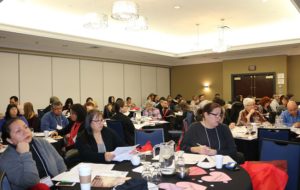Niigaan gdizhaami – moving forward together in education

By Marci Becking
TORONTO – School Board representatives from all over Anishinabek Nation territory met with First Nation Chiefs, education directors and the Kinoomaadziwin Education Board to discuss the Anishinabek Education System and the proposed implementation date of April 1, 2018.
Anishinabek Nation Grand Council Chief Patrick Madahbee said that colonizers kept First Nations in poverty and uneducated.
“Education is the key to turn this around,” said Madahbee at the Niigaan gdizhaami ‘We are Moving Forward Together’ forum. “We need to educate ourselves in our own way. We still have colonial policies against us – like the Indian Act. Some of our communities are seeing the last of our ‘Status Indians’ being registered. This is happening all over our territory.”
Mitzie Hunter, Ontario Education Minister, recited an African proverb: If you want to go fast; go alone. If you want to go far; go together.
“We want to go far,” Minister Hunter addressed the group of over 100 educators. “The Master Education Agreement will help Anishinabek First Nation student success.”
Negotiator Tracey O’Donnell says that the proposed Master Education Agreement will be a legally-binding agreement between the Anishinabek Education System First Nations and Ontario beginning on the effective date of the Anishinabek Nation Education Agreement.
“The Master Education Agreement will enhance opportunities for the engagement and participation of students, families, and communities to support student success and well-being,” says O’Donnell. “It will also increase knowledge and understanding of Bimaadziwin, Kendaaswin and Anishinaabe languages in the Anishinabek First Nations’ schools and provincially-funded schools. The role of the Elders in the community is maintaining the language and culture. It is important to keep Anishinaabemowin alive.”
The MEA allows the transition of students between the Anishinabek First Nations’ schools and provincially-funded schools. The MEA will establish a process to collaborate on and monitor, in addition to ongoing alignment of standards between the Anishinabek First Nations’ schools and the provincially-funded education system.
Ontario negotiator Jay Kaufman says that the Tripartite Work Plan among the Anishinabek First Nations, Canada and Ontario, lays out a road map to the establishment of the Anishinabek Education System on April 1, 2018.


